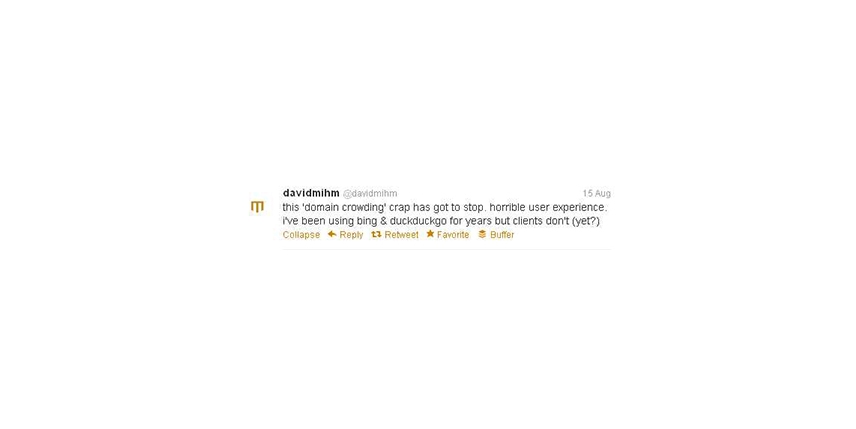Search quali ty has undoubtedly been Google’s watchword over the past 18 months, as unprecedentedly prickly algorithm updates have sent shock-waves through the Search Engine Optimisation community. As search marketers have squawked and scrambled to adjust, Google has firmly stood by its message of making the experience better for the user. Set against this backdrop, the problems that the search giant is experiencing with the issue of domain crowding are particularly challenging. If the term domain crowding doesn’t mean much to you, the concept likely will. Put simply, it’s the phenomenon of one website dominating organic search results on a given term, and it’s delivering a shockingly bad user experience in many cases on Google as we speak.
ty has undoubtedly been Google’s watchword over the past 18 months, as unprecedentedly prickly algorithm updates have sent shock-waves through the Search Engine Optimisation community. As search marketers have squawked and scrambled to adjust, Google has firmly stood by its message of making the experience better for the user. Set against this backdrop, the problems that the search giant is experiencing with the issue of domain crowding are particularly challenging. If the term domain crowding doesn’t mean much to you, the concept likely will. Put simply, it’s the phenomenon of one website dominating organic search results on a given term, and it’s delivering a shockingly bad user experience in many cases on Google as we speak.
Anecdotally, I’ve found the domain crowding issue to be wildly inconsistent. Here are a few examples: While signed into my work-related Google account the other day, searching to read up on the concept of microformats, I found something pretty incredible. On a simple Google search for “microformat,” the top 24 returned results were from the site microformat.org. You read that right; all 24 of the top results came from the same domain. Thinking this might be related to my search history, I turned off personal results, but nothing changed. That site is a great resource for information on microformats, but the lack of diversity in the results makes for poor user experience.
I then conducted the same search in a different browser, logged into my personal Google account, and only the top two results came from that site. Obviously, this is related to some kind of testing that Google is conducting, but the results and the way they vary are beyond puzzling. What makes this issue even more vexing is the fact that Google announced in April that it was rolling out an algorithm update to alleviate domain crowding. At that time, the Inside Search blog at Google said “sometimes search returns too many results from the same domain. This change helps surface content from a more diverse set of domains.” Wow. If you believe your own eyes and a whole passel of reports from around the web, the exact opposite has happened since.
This problem is infecting all kinds of queries, including (and perhaps especially) local searches. On a search for “emergency plumber Chicago,” 20 of the top 23 organic results were from the domain emergencyplumberschicago.com. The owner of that domain may be happy in the short term, but this is really bad news for everyone. Local search guru David Mihm has chimed in forcefully with his displeasure on this issue as well. Here’s a tweet from him from the other day:
If you want some more examples, here are more instances from others who are seeing the same thing: Google Search Results Show Extreme Domain Crowding Domain Crowding Update Breaks Google’s SERPs Domain Crowding is Shockingly Broken As for me, I still can’t believe what I’m seeing here. The reality of these search results directly contravenes everything Google has been saying for years and practically shouting in recent months. Could something like this really hurt Google? Will users, as Mihm suggests, start to vote with their feet and give engines like Bing another look? If things don’t change quickly, I see that as a likely outcome, at least to some degree. Are you seeing the same thing when you search? Let us know in the comments below.





